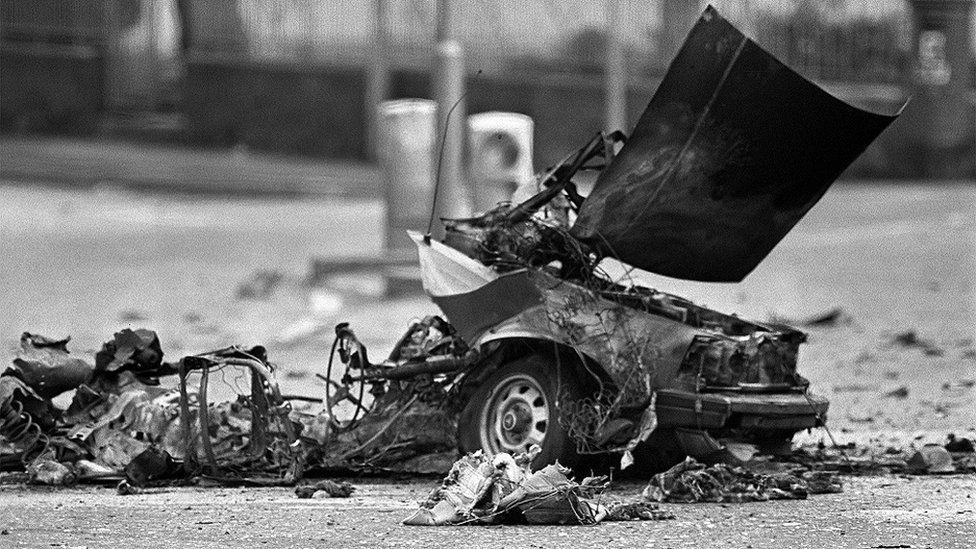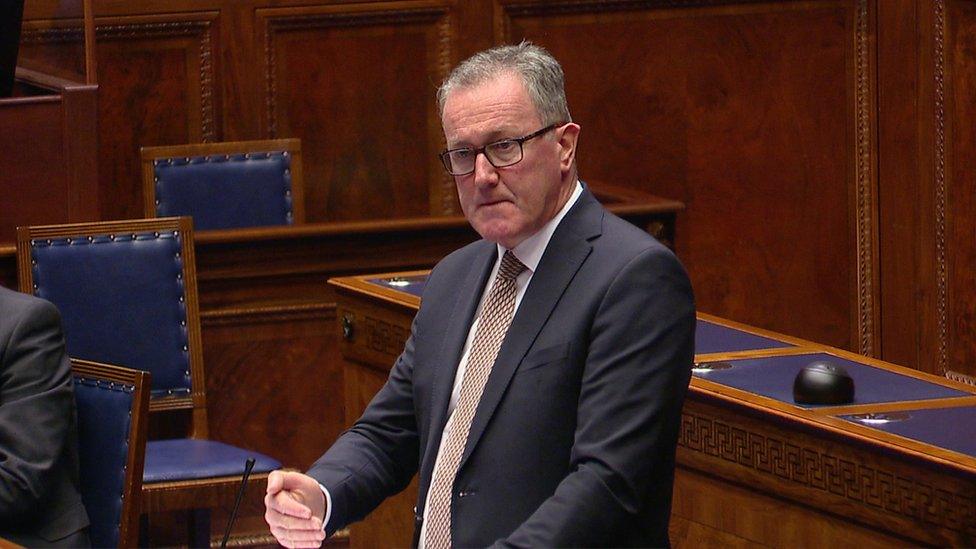Troubles pension scheme to open to applicants on 30 June
- Published

A dispute over how the pension should be funded was recently resolved following a legal challenge
A long-awaited pension for people badly injured during the Troubles will open for applications on 30 June.
It is already running more than a year behind schedule.
Mr Justice McAlinden, the head of the panel ruling on who qualifies for the scheme, said he had held a "constructive meeting" with victims' groups.
A dispute over how the pension should be funded was recently resolved following a legal challenge.
Earlier this month, Stormont's Executive Office formally pledged to pay for the pension, despite arguing that Westminster should foot the bill as it passed the initial legislation allowing the scheme to be created.
The estimated outlay for the scheme, over the next 20 years, could be up to £1.2bn.
Finance Minister Conor Murphy has said his department would make the necessary funding available to ensure eligible victims and survivors receive compensation, but warned it could have consequences for other departments' budgets in future.

Finance Minister Conor Murphy said his department would make the necessary funding available
On Tuesday, Mr Justice McAlinden said he was "delighted" to announce a date for the scheme to open for applications.
"As president, I have worked closely with the recently-appointed board members and the team established by the Department of Justice to develop the administrative arrangements for the payment scheme," he said.
"I have also held a number of constructive meetings with representatives from the main groups supporting the victims of the Troubles.
"This has helped to establish positive working relationships which should enable victims to have trust in the board.
"The many victims deserve the recognition and payments to which they are entitled."
It is anticipated there could be as many as 30,000 applications in total and the process could take years to work through, with annual payments of between £2,000 and £10,000.
The scheme could run for up to 30 years.

Another delay

No matter what way this is dressed up, this constitutes another delay.
It is also worth noting that 30 June is the intended date for the opening of applications.
Some will ask is it, in effect, a target date?
No reason is offered as to why the scheme will not open until the summer.
Previously, the most recent delay was pegged to providing applicants with guidance on medical assessments.
It is also still unclear how long it will take to turn around applications.
This is likely to be more complicated for those claiming in respect of mental trauma rather than physical injury.
But it looks like it will be much later in the year before the first payments are eventually made.

Justice Minister Naomi Long welcomed the announcement and said she "shared the frustration" of those who had been waiting for the delivery of this scheme.
"Much progress has been made since then and I am grateful to the president and members of the Victims' Payments Board for their commitment to make the scheme operational," she said.
"Victims and survivors of the Troubles have waited a long time for this scheme and today's announcement is an important milestone on what has been a long and painful journey for many."
Northern Ireland Affairs Committee chairman Simon Hoare said the announcement of a date would come as a "great relief to victims and survivors".
"It remains a travesty and a failure of public service that it has taken this long to deliver," he said.
What is the Victims' Payment Scheme?
The legislation came on to the statute book in January 2020. To qualify, you have to have an injury which is severe and permanent and caused by no fault of your own.
This can be physical injury, such as a loss of limbs, or psychological, caused by being present at a bombing, for example.
The scheme covers violence related to the Northern Ireland Troubles between 1966 and 2010, including incidents in Great Britain and Europe. Non-UK residents injured outside the UK cannot apply - such as victims of the Dublin and Monaghan bombings carried out by loyalists in 1974.
People will get between £2,000 and £10,000 a year for the rest of their lives. Upon their death, a spouse or carer, will get the payments for a further 10 years. The scheme is a recognition that criminal injuries awards from decades ago were largely inadequate.